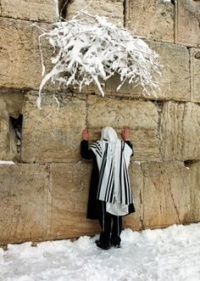Mitzvah to Daven
From Halachipedia
General Obligation
- Some early authorities consider the mitzvah to pray as a biblical mitzvah based on the verse “ולעבדו בכל לבבכם”[1] which Chazal explain as a reference to the service of the heart[2], ולעבדו connoting worship through prayer. Tefillah is listed as the fifth mitzvah in the Rambam's ספר המצות.[3] However, many early authorities argue that the entire obligation is rabbinic and only biblical in times of great distress (בעת צרה). [4]
- One who lengthens his prayers will merit a longer life. [5]
Women
- Women are obligated in saying Shmoneh Esrei of Shacharit and Mincha. [6] It is proper for women to accept the yoke of heaven by saying at least the first pasuk of Shema. [7]
- Women are not obligated in Arvit. If one wants to say it one should specify that it is done Bli Neder (so that it is not binding after 3 times of performing it). [8]
- Many poskim hold that women are exempt from saying Mussaf.[9]
- A woman who is unable to say Shmoneh Esrei of Shacharit should at least say a short prayer which includes praise, a request, and a thanks of Hashem. [10]
- A woman who has limited time for Shacharit should say parts of Tefillah according to the order of importance: 1) Shmoneh Esrei 2) first pasuk of Shema and Emet VeYatsiv before Shmoneh Esrei 3) Baruch SheAmar, Ashrei, and Yishtabach, 4) Birchot HaShachar, 5) Birkat HaTorah, 6) Birchot Kriyat Shema and the entire Shema and 7) Pesukei Dezimra. [11]
- According to the Sephardic minhag, women shouldn't recite the bracha of Baruch SheAmer, Yishtabach, or Birchot Kriyat Shema. [12]
- The minhag is that women don't say Tachanun. [13]
- According to Sephardim, a woman who doesn't have time should at least say Birchot Hashachar, Birchot HaTorah, and Shemona Esrei. It is also proper for them to also say Shema. [14]
Children
- Once a child knows how to speak one should teach them to say the first pasuk of Shema. [15]
- A child of 6 or 7 should be taught to say brachot of Kriyat Shema, Shema, and Shmoneh Esrei. [16]
- One should teach one's small children to answer Amen because once a child answers Amen it has a place in Olam Haba. [17]
Gentiles
- Gentiles are not obligated in Tefillah but if they do pray they fulfill a mitzvah, and are considered to be like a person who is not commanded but volunteers to do so. [18]
Sources
- ↑ Deuteronomy 11:13/דברים פרק יא פסוק יג
- ↑ Tanit 2a
- ↑ Rambam Tefillah 1:1,ספר המצוות לרמב"ם מצות עשה ה
- ↑ Ramban on ספר המצות, Mishna Brurah 106:4
- ↑ Sh"t Rivivot Ephraim 1:50:7 says that although the gemara Brachot 54b says this in reference to the amida, it is true for all prayers
- ↑ S”A 106:1, Mishna Brurah 106:4. See also Sh”t Yechave Daat 3:7 who writes that women are obligated in one Shmoneh Esrei a day but if they say three a day it is praiseworthy. Tefillah KeHilchata (chapter 1 note 17) quotes Rav Ben Tzion Abba Shaul who says that women are obligated in all Tefillot except Arvit.
- ↑ S”A and Rama 70:1, Mishna Brurah 70:5
- ↑ Mishna Brurah 106:4, Tefillah KeHilchata 1:11. Rabbi Hershel Schachter in a shiur on yutorah.org ("Women at Prayer", min 10-16) agrees and explains that women are not obligated to say Arvit since according to the gemara, Arvit is optional and although men have accepted it upon themselves to say Arvit, making it an obligation for men, the minhag however does not include women and therefore Arvit is not an obligation for them.
- ↑ Mishna Brurah 106:4 quotes the Tzlach (Brachot 26a s.v. VeShel Musafin) who says that women are exempt from Mussaf, while the Magen Giborim disagrees. Rabbi Hershel Schachter in a shiur on yutorah.org ("Women at Prayer", min 10-16) explains that the reason women are exempt, is that Mussaf is not about asking for mercy, which is the basis for women's obligation to pray (Gemara Brachot 20b). Additionally, Mussaf was instituted because of the korbanot Mussaf and women were not obligated in donating the Machasit HaShekel which was used for communal korbanot such as the Mussaf korbanot.
- ↑ Tefillah KeHilchata 1:10 based on Magen Avraham 106:2
- ↑ Tefillah KeHilchata (chapter 1 note 21).
- ↑ Yalkut Yosef (Dinim L'isha V'lbat 8:1-2). Tefillah KeHilchata (chapter 1 note 21) quotes Rav Ben Tzion Abba Shaul as saying that women may say Pesukei Dezimra and brachot of Kriyat Shema with Shem UMalchut and Sh”t Yabia Omer 2:6 holds that these brachot should be made without Shem UMalchut.
- ↑ Piskei Teshuvot 131:1, Tefillah KeHilchata 15:5
- ↑ Yalkut Yosef (Otzar Dinim Lisha Velebat p. 68, 77, 104)
- ↑ Mishna Brurah 70:7
- ↑ Tefillah KeHilchata 1:12-13
- ↑ Rama 124:7
- ↑ Sh”t O.C. Igrot Moshe 2:25 writes that non-Jews are not obligated to pray to Hashem but if they do they fulfill a mitzvah and receive reward as someone who is not commanded but nonetheless, volunteers. See Sh"t HaRambam 148 who writes even regarding Brit Milah that non-Jews can volunteer to perform a mitzvah.
